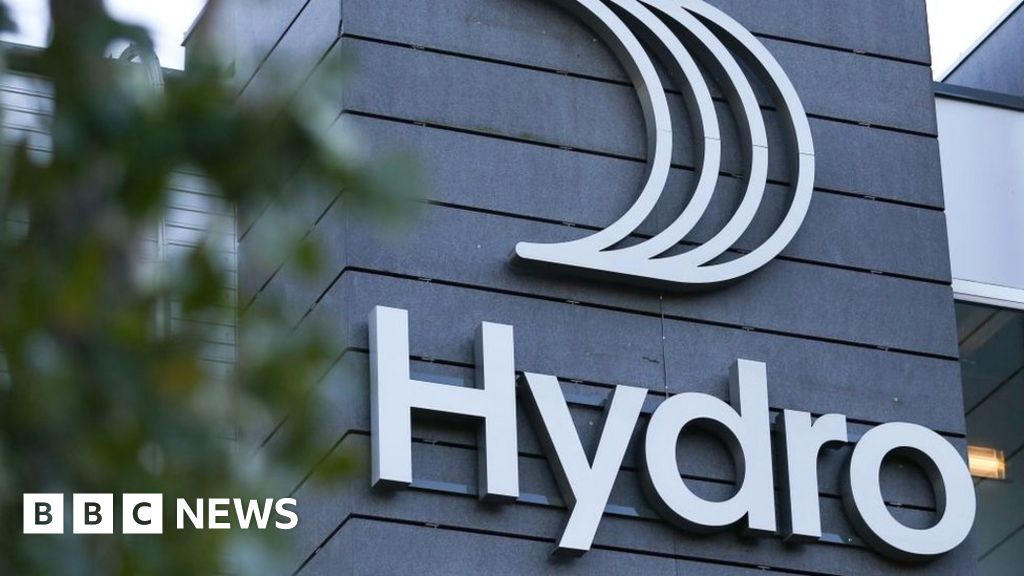Huge Aluminium Plants Hit By 'severe' Ransomware Attack

 Image copyright
Getty Images
Image copyright
Getty Images
One of the world's biggest aluminium producers has switched to manual operations at some smelting plants following a "severe" ransomware attack.
Hydro, which employs more than 35,000 people in 40 countries, says the attack began on Monday night and is ongoing.
Some of the company's factories have been forced to halt production though other facilities, including its power plants, are functioning normally.
The firm's website is down but updates are being posted to Facebook.
US factories were among those affected, as were smelting plants in Norway.
Notices have been posted at the entrances to some of Hydro's offices telling employees not to log in to their computers.
Staff worldwide are instead using mobile phones and tablets to access their emails, according to Hydro's chief financial officer Eivind Kallevik.
At some factories, workers are using printed order lists while they remain unable to retrieve order data from their computers.
Norwegian security authorities said they were investigating the possibility that the cyber-attack was caused by a relatively new form of ransomware known as LockerGoga. However, they added it was not yet clear that this was the case.
A spokesman for Hydro also told the BBC that he could not yet confirm who was behind the attack.
He added that digital systems at Hydro's main smelting plants were programmed to ensure machinery worked efficiently.
However, these systems had had to be turned off at some of the facilities.
"They are much more reliant today on computerised systems than they were some years ago," a spokesman said.
"But they have the option of reverting back to methods that are not as computerised, so we are able to continue production."
Work was also stopped at some metal extrusion plants, where aluminium is processed into products such as building facades.
The firm said it was working to contain and "neutralise" the attack and added that it had not caused any safety-related incidents.
It added that it had data backups ready with which to restore systems once the virus had been dealt with.
Norway's state cyber-security agency is helping Hydro to respond to the incident.
Cyber-security expert Kevin Beaumont told the BBC that if the LockerGoga ransomware had been used, it would likely have been deployed to Hydro's systems manually by an attacker.
This could have been done by someone who had gained administrator access to those systems.
"For an industrial manufacturing business this is potentially bad news, as it may have spread across their company, including near industrial control systems," added Mr Beaumont.
From Chip War To Cloud War: The Next Frontier In Global Tech Competition
The global chip war, characterized by intense competition among nations and corporations for supremacy in semiconductor ... Read more
The High Stakes Of Tech Regulation: Security Risks And Market Dynamics
The influence of tech giants in the global economy continues to grow, raising crucial questions about how to balance sec... Read more
The Tyranny Of Instagram Interiors: Why It's Time To Break Free From Algorithm-Driven Aesthetics
Instagram has become a dominant force in shaping interior design trends, offering a seemingly endless stream of inspirat... Read more
The Data Crunch In AI: Strategies For Sustainability
Exploring solutions to the imminent exhaustion of internet data for AI training.As the artificial intelligence (AI) indu... Read more
Google Abandons Four-Year Effort To Remove Cookies From Chrome Browser
After four years of dedicated effort, Google has decided to abandon its plan to remove third-party cookies from its Chro... Read more
LinkedIn Embraces AI And Gamification To Drive User Engagement And Revenue
In an effort to tackle slowing revenue growth and enhance user engagement, LinkedIn is turning to artificial intelligenc... Read more

